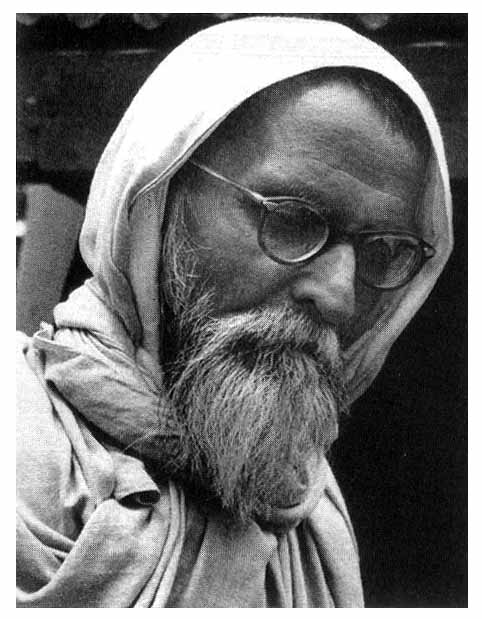Vinayak Narahari “Vinoba” Bhave (11 September 1895 – 15 November 1982) was an Indian advocate of nonviolence and human rights. Often called Acharya (Sanskrit for teacher), he is best known for the Bhoodan Movement. He is considered as a National Teacher of India and the spiritual successor of Mohandas Gandhi. He was the 1st person to be selected as a Satyagrahi followed by J.L Nehru in Individual Satyagraha by Mahatma Gandhi.
Vinoba (born Vinayaka Rao Bhave) was born into a pious Chitpavan Brahmin family on 11 September 1895 in a small village called Gagode (present day Gagode Budruk) in Kolaba now in Pen, Raigad district of Maharashtra. Vinayaka was the eldest son of Narahari Shambhu Rao and Rukmini Devi. The couple had five children – four sons and one daughter, named Vinayaka (affectionately called Vinya), Balakrishna, Shivaji and Dattatreya. His father, Narahari Shambhu Rao was a trained weaver with a rationalist modern outlook, and worked in Baroda. Vinayaka was brought up by his grandfather, Shamburao Bhave and was greatly influenced by his mother Rukmini Devi, a religious woman from Karnataka. Vinayak was highly inspired after reading the Bhagavad Gita, at a very young age.
A report in the newspapers about Gandhi’s speech at the newly founded Benaras Hindu University attracted Vinoba’s attention. In 1916, on his way to Mumbai (then Bombay) to appear for the intermediate examination, Vinoba Bhave put his school and college certificates into a fire. Vinoba took the decision after reading the piece of writing in the newspaper written by Mahatma Gandhi. He wrote a letter to Gandhi and after an exchange of letters, Gandhi advised Vinoba to come for a personal meeting at Kochrab Ashram in Ahmedabad. Vinoba met Gandhi on 7 June 1916 and subsequently abandoned his studies. Vinoba participated with keen interest in the activities at Gandhi’s ashram, like teaching, studying, spinning and improving the life of the community. His involvement with Gandhi’s constructive programmes related to Khadi, village industries, new education (Nai Talim), sanitation and hygiene also kept on increasing.
Vinoba went to Wardha on 8 April 1921 to take charge of the Ashram as desired by Gandhi. In 1923, he brought out Maharashtra Dharma, a Marathi monthly which had his essays on the Upanishads. Later on, this monthly became a weekly and continued for three years. In 1925, he was sent by Gandhi to Vaikom, Kerala to supervise the entry of the Harijans to the temple.
Vinoba was arrested several times during the 1920s and 1930s and served a five-year jail sentence in the 1940s for leading non-violent resistance to British rule. The jails for Vinoba had become the places of reading and writing. He wrote Ishavasyavritti and Sthitaprajna Darshan in jail. He also learnt four South Indian languages and created the script of Lok Nagari at Vellore jail. In the jails, he gave a series of talks on Bhagavad Gita in Marathi, to his fellow prisoners. Bhave participated in the nationwide civil disobedience periodically conducted against the British, and was imprisoned with other nationalists. Despite these many activities, he was not well known to the public. He gained national prominence when Gandhi chose him as the first participant in a new nonviolent campaign in 1940.
He was associated with Mahatma Gandhi in the Indian independence movement. He stayed for some time at Gandhi’s Sabarmati ashram in a cottage that was named after him, ‘Vinoba Kutir’. In 1932 he was sent to jail by the British colonial government because of his activism against British rule. There he gave a series of talks on the Gita, in his native language Marathi, to his fellow prisoners.
These highly inspiring talks were later published as the book “Talks on the Gita”, and it has been translated into many languages both in India and elsewhere. Vinoba felt that the source of these talks was something from above and he believed that its influence will endure even if his other works were forgotten.
In 1940 he was chosen by Gandhi to be the first individual Satyagrahi (an individual standing up for Truth instead of a collective action) against the British rule.It is said that Gandhi envied and respected Bhave’s celibacy, a vow he made in his adolescence, in fitting with his belief in the Brahmacharya principle. Bhave also participated in the Quit India Movement.
In 1958 Vinoba was the first recipient of the international Ramon Magsaysay Award for Community Leadership.He was awarded the Bharat Ratna posthumously in 1983.
Vinoba spent the later part of his life at his Brahma Vidya Mandir ashram in Paunar in Wardha district of Maharashtra. He died on 15 November 1982 after refusing food and medicine for a few days by accepting “Samadhi Maran” / “Santhara” as described in Jainism. The Prime Minister of India, Indira Gandhi, who was visiting Moscow to attend the funeral of Soviet leader Leonid Brezhnev, cut short her visit to be at the funeral of Vinoba.
(Ref:https://en.wikipedia.org/wiki/Vinoba_Bhave & www.mkgandhi.org)
